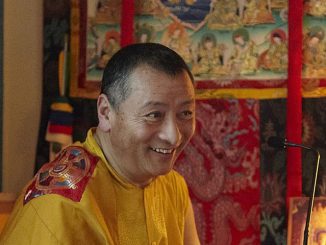
The next four lines of this song make a point that is of incredibly great importance for any vajrayana practitioner.
In the first line he says: Unbearably intense longing and devotion blazed. So, he [Terchen Barway Dorje] is indentifying the condition of his realization and experience. His realization and experience arose during the feast [vajrayana tsok practice]. Why? Because of his devotion. Longing here means longing for the presence of the guru.
In the second line he says: I knew that whatever appears and exists is my guru’s display. And this is the key line here. “I knew” means that he wasn’t imagining it, and whatever appears and exists is my guru’s display means he recognized the nature of everything to be inseparable from the guru. We would say “the face of the guru.”
Now, what do these two lines mean? They are describing the confidence and joy that are, in a sense, the characteristic of vajrayana practice. This confidence and joy come from unreserved entrustment of oneself to the root guru. And this unreserved entrustment to the root guru is based upon the simple understanding [that] even though I, the practitioner, have no blessing, have no power, have nothing special that makes me different from anyone else, the blessing of my root guru is unassailable, unquestionable, and that gives one confidence. One’s confidence and joy come from totally entrusting oneself to the root guru. Such an attitude of prayer or supplication, such an attitude of devoted entrustment to the guru causes you to experience the non-duality, the inseparability, of your mind and the mind of your guru. It makes no difference in this context whether your guru is living or has passed away because you experience their vivid presence at that moment. This will be overwhelming. You’ll break out in goose bumps and break out in tears and so on.
He further describes this in the third line where he says: I gained confidence in the inseparability of my mind and my guru. All the confidence associated with this type of practice comes from that — recognizing the inseparability of one’s mind and the guru. What is this recognition? It’s the experience of there being no difference, no boundary or border, between you and your guru. It’s the experience of all of the guru’s attributes — his body, speech, mind, his ability to benefit beings, his activity, his attainment – being present in your world, present within you, within your being.
Then he says: I knew it to be self-apparent and self-arisen; it was revealed. In other words, in the experience and through the experience of the inseparability of himself and his root guru, he experiences the self-appearing, self-arisen wisdom which is within the mind. It is revealed to him through devotion to his guru.
[From a teaching on The Song of the Young Bee by Bardor Tulku Rinpoche in Evansville, Indiana in 2012. Translated by Lama Yeshe Gyamtso.]

